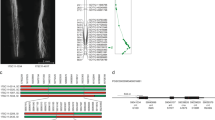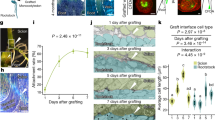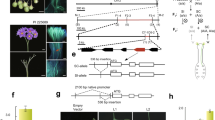Abstract
THE use of X-ray treatment1 can produce from periclinal chimeras of potatoes (Solanum tuberosum L.) a small frequency (about 5–10 per cent) of plants which have at least the two outer layers at the growing point (L1 and L2) with the constitution of L1 in the chimera. Sports for large changes in leaf shape2 probably always have a mutated L2 and in many cases the mutation is also in L3. Such sports cannot therefore be shown to be chimeras by either breeding or eye-excision experiments; this explains why the ivy-leaf sport (Figs. 1a and b) has not previously been shown to be a chimera.
This is a preview of subscription content, access via your institution
Access options
Subscribe to this journal
Receive 51 print issues and online access
$199.00 per year
only $3.90 per issue
Buy this article
- Purchase on Springer Link
- Instant access to full article PDF
Prices may be subject to local taxes which are calculated during checkout
Similar content being viewed by others
References
Howard, H. W., Rad. Bot., 4, 361 (1964).
Howard, H. W., Wainwright, J., and Fuller, J. M., Genetica, 34, 113 (1963).
Howard, H. W., Nature, 208, 197 (1965).
Author information
Authors and Affiliations
Rights and permissions
About this article
Cite this article
HOWARD, H. Periclinal Nature of the Ivy-leaf Sport in Potatoes. Nature 209, 108–109 (1966). https://doi.org/10.1038/209108b0
Issue Date:
DOI: https://doi.org/10.1038/209108b0
This article is cited by
-
The chimerical nature of a feathery wilding
Potato Research (1969)
Comments
By submitting a comment you agree to abide by our Terms and Community Guidelines. If you find something abusive or that does not comply with our terms or guidelines please flag it as inappropriate.



